Anthony Papagiannis
Thessaloniki, Greece
 |
|
| Olive Tree with Pansies, Loutraki, Greece |
Memory, the ability to recall at will previous events and various facts, is a precious mental faculty, an asset that underpins learning, knowledge, and experience in any field of human endeavor. In medicine its value is undeniable, though for legal as well as practical purposes, it must be supplemented with written records: no court of law would accept a medical testimony based purely on personal recollection.
As time goes by we come to trust the speed and accuracy of our memory less and less. Sherlock Holmes famously told Dr. Watson in their early days together: “A man’s brain originally is like a little empty attic, and you have to stock it with such furniture as you choose […]. It is a mistake to think that that little room has elastic walls and can distend to any extent. Depend upon it, there comes a time when for every addition of knowledge you forget something that you knew before.”1 Modern science may smile condescendingly at this simplistic nineteenth century neurophysiological explanation. It is, however, a fact that we perceive increasing memory loss as a warning sign of impending dementia, and dread it. We gradually realize that we cannot rely on our once-strong memory as we used to. We mistake names and faces, we forget what we prescribed a few days ago for a given patient, and sometimes we are viewed with apprehension by our patients for such lapses: how much can they trust our judgment if memory fails us? That is why, on those occasions that memory serves us well, we take a little pride in it.
A couple of recent events confirmed the above, and acted as prompts for musing on the subject. I was asked to see a patient preoperatively. On hearing his wife’s maiden name I commented that I once had a patient by that name. I had only seen him once, but I could remember that he was a musician: he had cancer at a young age, and – importantly – he had no health insurance in his home country as he lived mostly abroad. “Was his first name Harry?” she asked. “He was a first cousin, and we grew up together. We shared a grandfather, so I am Harriet.” I confirmed the facts later from my office records. That single consultation had taken place fourteen years earlier.
A few months back I happened to visit the local cemetery. It is a vast place, and whenever I go there I tend to read the inscriptions on the gravestones as I wander about. Every so often I come across a familiar name: a past patient, an old neighbor, a university professor, a colleague. On that occasion I spotted a name that rang a bell, just a few places away from my father’s grave. The age matched my mental file: he had passed away at forty-five. An elderly black clad woman was lighting a candle and arranging some flowers there. I felt an urge to speak to her. “You must be Nick’s mother,” I said. “I am the doctor who diagnosed his final disease.” That had been more than five years ago. She was surprised to hear this, but also eager to talk. I gave her a lift back to the city, and we reminisced about Nick and his illness, and her own life without him. There was no point in telling her that my recollection was based on the fact that he had a prominent Horner’s syndrome; at that time I had felt quite proud about my spot diagnosis of a Pancoast tumor at the top of his right lung before looking at his imaging studies.
Importantly, memory links us with the past. Without memories we are not ourselves: each single “today” is just a snapshot or a short video clip, detached from any context. It could easily belong to a thousand different people, each of them entirely discrete from all the others. Looking at an old school photograph I see forty eleven-year-old boys and girls. What differentiates them, apart from their facial features, is whatever I can remember about each one of them. Boy A used to be my best friend, that blond girl B was my first childhood love, C used to lisp. I had a fist fight once with D; E had a brother who was a classmate of my brother; I met F ten years later at university. Without these synaptic connections to the past, the person loses a vital dimension.2 This is why amnesia is so gnawingly painful. It also explains why we talk about “treasuring our memories.” We are poor and destitute without them.
References
- Doyle AC. A Study in Scarlet. Chapter 2. The science of deduction. Accessible at https://www.gutenberg.org/files/244/244-h/244-h.htm#link2HCH0002
- Cassel EJ. The nature of suffering and the goals of medicine. N Engl J Med 1982; 306: 639-45.
ANTHONY PAPAGIANNIS, MD, MRCP(UK), DipPallMed, FCCP, is a practicing pulmonologist in Thessaloniki, Greece. He trained in Internal Medicine in Greece and subsequently in the United Kingdom, and specialized in Pulmonary Medicine. He also holds a postgraduate Diploma in Palliative Medicine from the University of Cardiff, Wales. He is a postgraduate instructor in palliative medicine in the University of Thessaly, Larissa, Greece. He also edits the journal of the Thessaloniki Medical Association.
Fall 2018 | Sections | Doctors, Patients, & Diseases

Leave a Reply